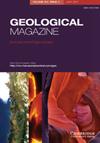吉林南部金营金矿床成因:来自年代学和同位素地球化学的约束
IF 2
3区 地球科学
Q3 GEOSCIENCES, MULTIDISCIPLINARY
引用次数: 0
摘要
金营金矿位于中国东北吉林省南部,是该地区早白垩世大型金矿床的代表。为更好地了解矿床成因,开展了U-Pb-Rb-Sr-He-Ar-S多同位素综合分析。研究区花岗闪长斑岩和闪长斑岩的锆石激光烧蚀电感耦合等离子体质谱(LA-ICP-MS)测年结果显示,锆石年龄分别为172.1±1.2 Ma和122.5±0.8 Ma,对应的侵入期为中侏罗统和早白垩统。黄铁矿Rb-Sr定年等时年龄为120±3 Ma,成矿时间为早白垩世。黄铁矿流体包裹体的3He/4He比值集中在0.08 ~ 0.13 Ra的小范围内,40Ar/36Ar比值集中在331.6 ~ 351.3之间,地幔He集中在1.0 ~ 1.6%之间,表明成矿流体为壳幔混合源。黄铁矿原位S同位素值在+ 0.1‰~ + 2.8‰之间变化,表明与矿有关的硫来自深部岩浆源。结合研究区地质历史,认为金矿化可能与古太平洋板块回退相关的伸展环境有关。本文章由计算机程序翻译,如有差异,请以英文原文为准。
Genesis of the Jinying gold deposit, southern Jilin Province, NE China: Constraints from geochronology and isotope geochemistry
The Jinying gold deposit is located in southern Jilin Province in northeast China and is representative of the large Early Cretaceous gold deposits in this area. To better understand ore genesis of this deposit, a multi-isotope integrated analysis of U–Pb–Rb–Sr–He–Ar–S has been carried out. Laser ablation inductively coupled plasma–mass spectrometry (LA–ICP–MS) dating of zircons from the granodiorite porphyry and dioritic porphyrite in the study area yields ages of 172.1 ± 1.2 Ma and 122.5 ± 0.8 Ma, suggesting that corresponding intrusion occurred in the Middle Jurassic and the Early Cretaceous. Rb–Sr dating of the pyrite yields an isochron age of 120 ± 3 Ma, suggesting that gold mineralization occurred in the Early Cretaceous. The fluid inclusions in pyrite yield 3 He/4 He ratios clustered within a small range from 0.08 to 0.13 Ra, 40 Ar/36 Ar ratios between 331.6 and 351.3, and mantle He in the range of 1.0–1.6%, indicating that the ore-forming fluids originated from a mixed crustal and mantle source. The in situ S isotopic values of pyrite vary between + 0.1 ‰ and + 2.8 ‰, suggesting that the ore-related sulphur came from the deep magmatic source. Combined with the geological history of the study area, it can be concluded that the gold mineralization was possibly related to the extensional setting associated with the rollback of the Palaeo-Pacific Plate.
求助全文
通过发布文献求助,成功后即可免费获取论文全文。
去求助
来源期刊

Geological Magazine
地学-地球科学综合
CiteScore
4.70
自引率
0.00%
发文量
111
审稿时长
3 months
期刊介绍:
Geological Magazine, established in 1864, is one of the oldest and best-known periodicals in earth sciences. It publishes original scientific papers covering the complete spectrum of geological topics, with high quality illustrations. Its worldwide circulation and high production values, combined with Rapid Communications and Book Review sections keep the journal at the forefront of the field.
This journal is included in the Cambridge Journals open access initiative, Cambridge Open Option.
 求助内容:
求助内容: 应助结果提醒方式:
应助结果提醒方式:


